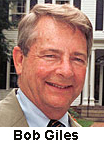Each week the web site ask guests to weigh in with their thoughts about CBS News and the media at large.
 Giles, curator of the Nieman Foundation at Harvard University and former Beacon Journal managing editor and executive editor, this week discusses the harm in U.S. news outlets' lack of tough questions
Giles, curator of the Nieman Foundation at Harvard University and former Beacon Journal managing editor and executive editor, this week discusses the harm in U.S. news outlets' lack of tough questionsHere is an excerpt of what Giles said:
“Not long ago, I was with a group of journalists looking at videotapes of a BBC reporter interviewing British Prime Minister Tony Blair. The reporter was clearly well informed and was aggressively pressing Blair when the prime minister’s answers seemed less than forthcoming. It was wonderful journalistic combat and highly informative for the audience.”
“These interviews represent a striking contrast with the U.S. television, where there is an absence of spirited inquiry. Public officials are treated with courtesy, which is appropriate, but on balance are accorded far too many opportunities to respond to reporters’ queries without challenge. When the reporter fails to probe more deeply, he or she becomes simply an electronic stenographer providing the elected official or official spokesperson a video platform for getting out the message.
“A recent CBS News Investigative Unit story offers a case in point. The story reported that billions of dollars spent on the Iraq War may have been lost to contractor waste, fraud and abuse. The story was based on a whistleblower lawsuit that had been obtained by CBS News.
“In the segment, forthright and detailed comments were made during on-camera interviews with Sen. Patrick Leahy, D-Vt., who as new chair of the Senate Judiciary Committee plans to investigate how taxpayer dollars have been spent in Iraq, and Alan Grayson, a lawyer who has filed dozens of lawsuits against contractors.
“The government response came from a “senior Justice Department official” who was not shown on camera and who was quoted indirectly as saying that it takes two to three years to investigate civil fraud cases and, even then, only about one in five meet the standards necessary for prosecution.
“If the reporter challenged the official to respond more directly to the allegations, this was not shared with viewers, leaving the impression that the Justice Department got away with a non-response.”
Click on the headline to read the full story.
1 comment:
Here's a brief bio:
Robert H. Giles is Curator of the Nieman Foundation. He worked for nearly 40 years as a newspaper reporter and editor, most recently as editor and publisher of The Detroit News, which he joined in 1986 as executive editor. From 1977-1986, Giles was executive editor and then editor at the Democrat & Chronicle and the Times-Union, in Rochester, N.Y. His newspaper career began in 1958 at the Beacon Journal, where he held several reporting and editing positions before becoming managing editor and then executive editor.
Giles is a graduate of DePauw University and the Graduate School of Journalism at Columbia University. He was a Nieman Fellow in 1966. He received an honorary Doctorate in Journalism from DePauw in 1996.
Post a Comment